“Punting the Pundits” is an Open Thread. It is a selection of editorials and opinions from around the news medium and the internet blogs. The intent is to provide a forum for your reactions and opinions, not just to the opinions presented, but to what ever you find important.
Thanks to ek hornbeck, click on the link and you can access all the past “Punting the Pundits”
Paul Krugman: The Intimidated Fed
Last month more than 14 million Americans were unemployed by the official definition – that is, seeking work but unable to find it. Millions more were stuck in part-time work because they couldn’t find full-time jobs. And we’re not talking about temporary hardship. Long-term unemployment, once rare in this country, has become all too normal: More than four million Americans have been out of work for a year or more.
Given this dismal picture, you might have expected unemployment, and what to do about it, to have been a major focus of Wednesday’s press conference with Ben Bernanke, the chairman of the Federal Reserve. And it should have been. But it wasn’t.
Glen Greenwald: A More Militarized CIA for a More Militarized America
The first four Directors of the CIA (from 1947-1953) were military officers, but since then, there has been a tradition (generally though imperfectly observed) of keeping the agency under civilian rather than military leadership. That’s why George Bush’s 2006 nomination of Gen. Michael Hayden to the CIA provoked so many objections from Democrats (and even some Republicans).
The Hayden nomination triggered this comment from the current Democratic Chairwoman of the Senate Intelligence Committee, Dianne Feinstein: “You can’t have the military control most of the major aspects of intelligence. The CIA is a civilian agency and is meant to be a civilian agency.” The then-top Democratic member of the House Intelligence Committee, Jane Harman, said “she hears concerns from civilian CIA professionals about whether the Defense Department is taking over intelligence operations” and “shares those concerns.” On Meet the Press, Nancy Pelosi cited tensions between the DoD and the CIA and said: “I don’t see how you have a four-star general heading up the CIA.” Then-Sen. Joe Biden worried that the CIA, with a General in charge, will “just be gobbled up by the Defense Department.” Even the current GOP Chair of the House Intelligence Committee, Pete Hoekstra, voiced the same concern about Hayden: “We should not have a military person leading a civilian agency at this time.”
Of course, like so many Democratic objections to Bush policies, that was then and this is now. Yesterday, President Obama announced — to very little controversy — that he was nominating Gen. David Petraeus to become the next CIA Director. The Petraeus nomination raises all the same concerns as the Hayden nomination did, but even more so: Hayden, after all, had spent his career in military intelligence and Washington bureaucratic circles and thus was a more natural fit for the agency; by contrast, Petraues is a pure military officer and, most of all, a war fighting commander with little background in intelligence. But in the world of the Obama administration, Petraeus’ militarized, warrior orientation is considered an asset for running the CIA, not a liability.
That’s because the CIA, under Obama, is more militarized than ever, as devoted to operationally fighting wars as anything else, including analyzing and gathering intelligence….
After more than a century as the world’s largest economy, the US will need to adjust to its declining global hegemony
Various observers have noted this week that China’s economy will be bigger than that of the United States in 2016. This comes from the International Monetary Fund’s (IMF’s) latest projections, which were made in its semi-annual April world economic outlook database. Since 2016 is just a few years away, and it will be the first time in more than a century that the United States will no longer be the world’s largest economy, this development will be the object of some discussion – from various perspectives.
First, let’s consider the economics. China has been the world’s fastest growing economy for more than three decades, growing 17-fold in real (inflation-adjusted) terms since 1980. It is worth emphasising that most of this record growth took place (1980-2000) while the rest of the developing world was doing quite badly by implementing neoliberal policy changes – indiscriminate opening to trade and capital flows, increasingly independent central banks, tighter (and often pro-cyclical) fiscal and monetary policies, and the abandonment of previously successful development strategies.
Ray McGovern: Petraeus: Can He Tell It Straight?
The news that President Barack Obama has picked Gen. David Petraeus to be CIA director raises troubling questions, including whether the commander most associated with the wars in Iraq and Afghanistan will tolerate objective analysis of those two conflicts.
What if CIA analysts assess the prospects of success in those two wars as dismal and conclude that the troop “surges” pushed so publicly by Petraeus wasted both the lives of American troops and many billions of taxpayer dollars? Will CIA Director Petraeus welcome such critical analysis or punish it?
The Petraeus appointment also suggests that the President places little value on getting the straight scoop on these key war-related issues. If he did want the kind of intelligence analysis that, at times, could challenge the military, why is he giving the CIA job to a general with a huge incentive to gild the lily regarding the “progress” made under his command?
Jim Hightower: From Democracy to Plutocracy
There’s nothing conservative about Gov. Walker’s autocratic power grab.
In American politics, the past not only sticks with us, but it often provides the best definition of what’s going on in the politics of the present, so it can be useful to revisit some powerful words from our history.
Today’s media and political powers, for example, keep using the word “conservative” to describe current political trends in our democratic republic. Poor choice of words. From the Koch brothers to the U.S. Chamber of Commerce, from GOP House Speaker John Boehner to such anti-worker governors as Scott Walker of Wisconsin, an autocratic power grab is underway to enthrone corporate power and moneyed elites to rule unilaterally over our government, economy, and environment. There’s nothing conservative about that.
Rather, a word from America’s past best encapsulates their goal: plutocracy. It’s the direct opposite of democracy, which is government by the many, by all of the people–by us. Plutocracy, on the other hand, is government by the wealthy–by them and for them.
Richard Dreyfuss: Panetta, Petraeus, Allen: Bad News, Good News
There’s good news and bad news in the decision to shift Leon Panetta from CIA to Defense and replace him with General David Petraeus. Let’s start with the bad news first.
Most disappointing are the signals from the White House that the changes represent merely personnel shifts and don’t represent policy changes. Maybe it’s too much to expect President Obama, already preparing for his 2012 re-election bid, to admit that he has to oversee a drastic retooling of his foreign policy, and that putting new people in new positions is a way to start the ball rolling. Certainly, given the upheaval shaking the region from Morocco to Afghanistan and the free-fall decline of American power and influence throughout that part of the world, you’d think that Obama might want to rethink the direction of US policy. But in preparing the world for the appointments of Panetta and Petraeus, the White House is insisting on continuity, not change. Vis-à-vis Afghanistan, in particular, that’s a bad mistake, since Obama seems intent so far on walking a middle course between supporters of a withdrawal from Afghanistan and the stay-the-course hawks who insist that the Taliban and its allies can be defeated militarily. The result of that cautious, typically Obama-led approach is likely to be a gradual pullout of about 30,000 troops over the next eighteen months, a slow, grinding drawdown through the end of 2014, and an intensive effort to maintain US forces there in smaller numbers for years to come.
Johann Hari: Donald Trump Has Revealed the Truth About the Republican Party
Since the election of Barack Obama, the Republican Party has proved that one of its central intellectual arguments was right all along. They have long claimed that evolution is a myth believed in only by whiny liberals — and it turns out they were onto something. Every six months, the Republican Party venerates a new hero, and each time it is somebody further back on the evolutionary scale.
Sarah Palin told cheering rallies that her message to the world was: “We’ll put a boot in your ass, it’s the American way!” — but that wasn’t enough. So they found Michele Bachmann, who said darkly it was an “interesting coincidence” that swine flu only breaks out under Democratic presidents, claims the message of The Lion King is “I’m better at what I do because I’m gay,” and argues “there isn’t even one study that can be produced that shows carbon dioxide is a harmful gas.”

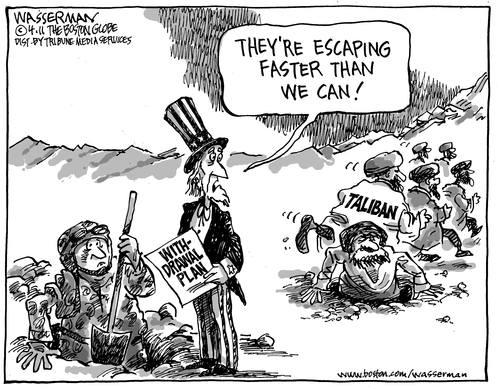 Katrina vanden Heuvel:
Katrina vanden Heuvel:  Dean Baker:
Dean Baker: 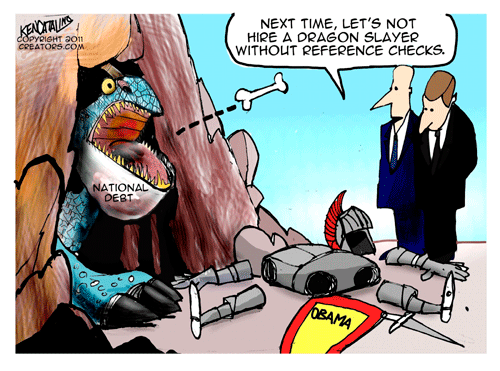 Paul Krugman:
Paul Krugman: 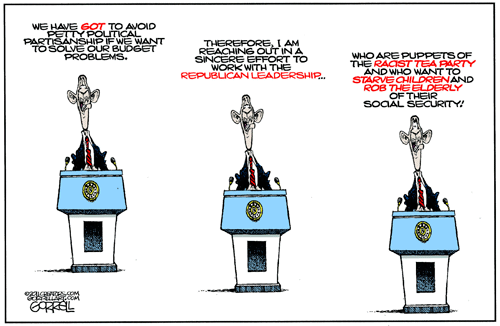

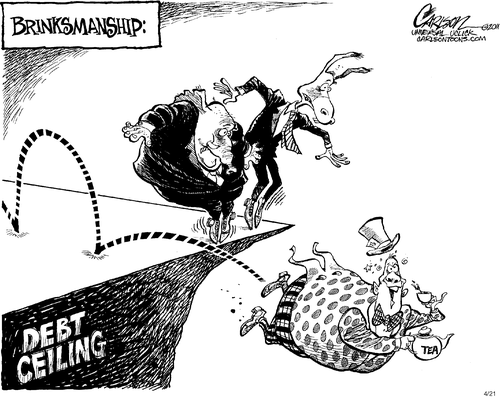 New York Times Editorial:
New York Times Editorial: 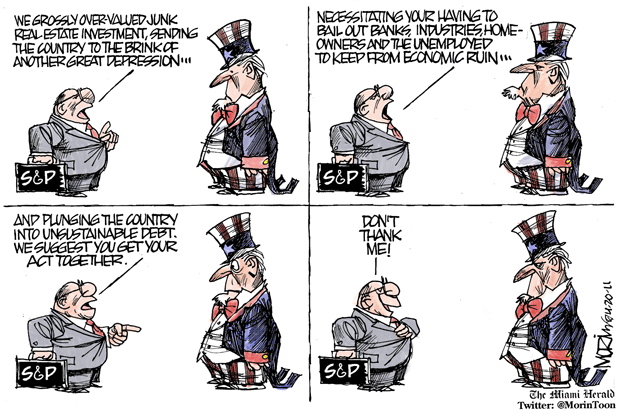
Recent Comments